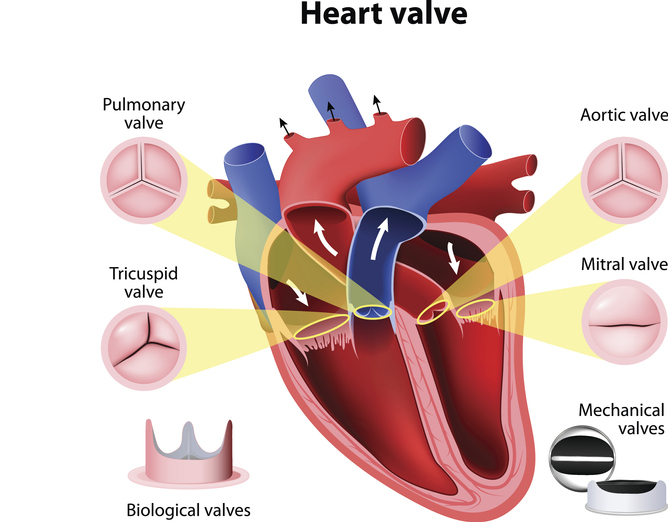
Congressman’s Wife Dies Of Mitral Valve Prolapse At Just 39. How Can We Be Proactive?
By Joy Stephenson-Laws, J.D., Founder
In very tragic news, Kentucky Rep. Andy Barr recently laid his wife, Eleanor Carol Leavell Barr (who went by Carol), to rest. She was just 39-years-old and a mother to her and Barr’s two young daughters.
According to reports, Carol was found dead in her home office. After an autopsy was performed, it was determined that the young mother and wife died of a heart condition called mitral valve prolapse (MVP).
What is mitral valve prolapse (MVP)?
Also known as Barlow’s syndrome and floppy valve syndrome, MVP, as the name suggests, involves a prolapse (a bulging or falling out) of the mitral valve. If you look at the diagram of the heart below, you can see that the heart contains four valves. The purpose of the mitral valve is to help move blood from the left atrium to the left ventricle. Essentially, heart valves prevent the backward flow of blood.

With MVP “...the heart’s mitral valve doesn’t work well. The flaps of the valve are ‘floppy’ and may not close tightly. These flaps normally help seal or open the valve,” reports the National Heart, Lung and Blood Institute (a branch of the NIH).
What happened to Rep. Barr’s wife is actually not that common.
“Much of the time, MVP doesn’t cause any problems. Rarely, blood can leak the wrong way through the floppy valve. This can lead to palpitations, shortness of breath, chest pain, and other symptoms...When backflow occurs, it can get worse over time and it can change the heart’s size and raise pressure in the left atrium and lungs. Backflow also raises the risk of heart valve infections.”
Additional symptoms of MVP may include cough, fatigue, anxiety, dizziness and migraines. These symptoms may be confused for other conditions or simply be attributed to stress and being overworked. And many people do not even experience symptoms.
A silent killerMVP appears to be somewhat of a silent killer in some instances.
“Mitral valve prolapse (MVP) is a common valve abnormality in general population. Despite the general belief of a benign disorder, several articles since the 1980s report sudden cardiac death (SCD) in MVP patients, with a substantial percentage of asymptomatic young individuals,” reports the Journal of Thoracic Disease.
Carol Barr was young and appeared to be healthy otherwise.
Penn Medicine reports that an estimated three to five percent of the American population is affected by MVP. It is actually said to be one of the most common heart valve conditions in the U.S.
The exact cause of MVP is unknown, but it may be hereditary. There is also secondary mitral valve prolapse.
“In secondary Mitral Valve Prolapse, the flaps are not thickened. The prolapse may be due to ischemic damage (caused by decreased blood flow as a result of coronary artery disease) to the papillary muscles attached to the chordae tendineae or to functional changes in the myocardium. Secondary Mitral Valve Prolapse may result from damage to valvular structures during acute myocardial infarction, rheumatic heart disease, or hypertrophic cardiomyopathy (occurs when the muscle mass of the left ventricle of the heart is larger than normal),” reports John Hopkins Medicine.
We may be proactive about MVP by keeping our hearts healthy through healthy lifestyle habits such as good nutrition, avoiding smoking, drinking alcohol in moderation (if at all) and regular physical activity.
(For other pH Labs blogs discussing heart health, click here).
The pH Labs team highly recommends taking routine nutrient tests to determine whether you are consuming adequate nutrients to keep your heart healthy and strong. If the test reveals that you have nutritional deficiencies or are not nutritionally balanced, a competent healthcare professional can work with you on making the necessary dietary changes and recommend quality supplements or intravenous hydration if necessary.
It is also important to know that a mitral valve prolapse is usually diagnosed through a checkup that involves a doctor listening to your heart with a stethoscope. People with MVP may have a heart that makes a clicking sound when it beats. If your doctor suspects something, you may be advised to have an x-ray or echocardiogram. It also never hurts to express your concerns about MVP. Have your heart examined at your next doctor’s visit.
In severe cases of MVP, surgery may be required. “In many instances, having MVP won’t impact your health and requires no treatment. Talk with your health care provider about how to prevent complications from MVP based on your level of risk. If you’re prescribed medication, take it as directed,” according to the American Heart Association.
Most of all, we hope you take this information to heart and take care of your heart health.
Enjoy your healthy life!
The pH professional health care team includes recognized experts from a variety of health care and related disciplines, including physicians, attorneys, nutritionists, nurses and certified fitness instructors. This team also includes the members of the pH Medical Advisory Board, which constantly monitors all pH programs, products and services. To learn more about the pH Medical Advisory Board, click here.







